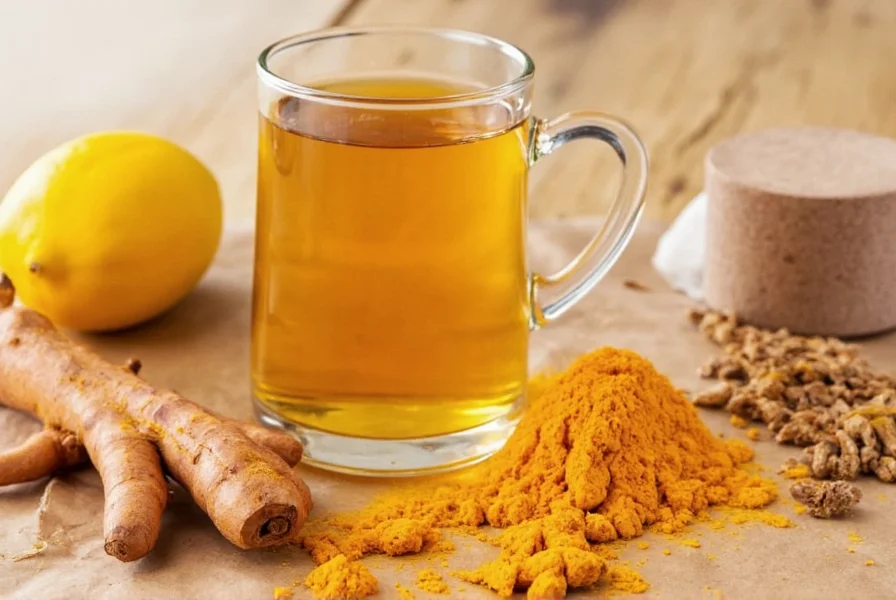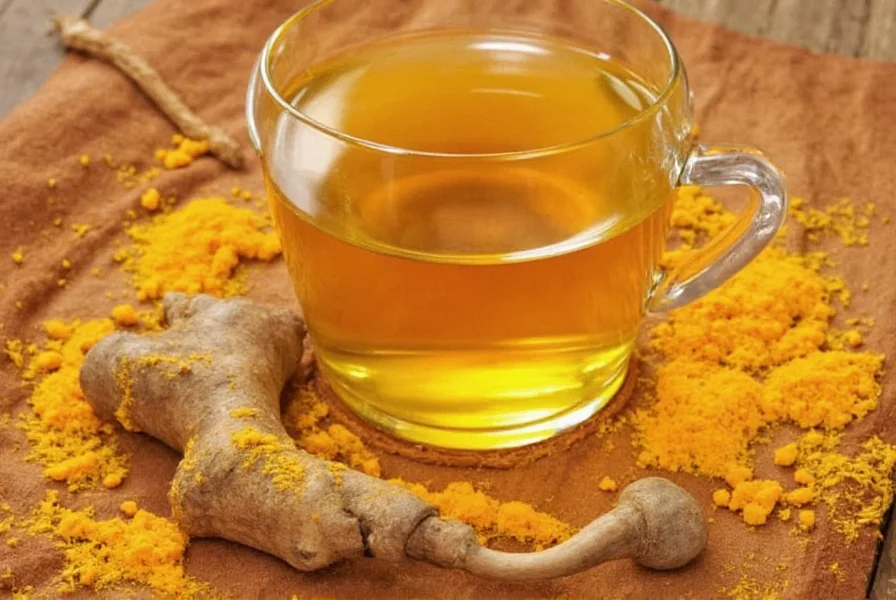Turmeric tea has gained significant popularity in wellness circles for its potential health benefits and simple preparation. This golden-hued beverage harnesses the power of curcumin, turmeric's active compound, which numerous studies suggest may support inflammation management and overall wellness when properly prepared. Unlike turmeric supplements, tea offers a gentle way to incorporate this spice into your daily routine with minimal risk of side effects when consumed in moderation. Understanding how to prepare turmeric tea for maximum benefits while avoiding common pitfalls is essential for those seeking natural wellness approaches.
What Exactly is Turmeric Tea?
Turmeric tea isn't technically a "tea" in the traditional sense, as it doesn't come from the Camellia sinensis plant. Instead, it's an herbal infusion (tisane) made from the rhizome of the Curcuma longa plant. Fresh turmeric root or dried turmeric powder serves as the base, often enhanced with complementary ingredients that boost both flavor and bioavailability.
The key to effective turmeric tea lies in understanding that curcumin—the primary active compound in turmeric—has low bioavailability on its own. This explains why traditional preparations often include black pepper (which contains piperine) and a source of healthy fat, both of which significantly increase curcumin absorption. When exploring how to make turmeric tea at home, these elements are crucial for maximizing potential health benefits of turmeric tea.

Science-Backed Health Benefits of Turmeric Tea
While turmeric tea shouldn't be considered a medical treatment, research suggests several potential wellness benefits. The effectiveness of turmeric tea for inflammation depends significantly on proper preparation techniques that enhance curcumin bioavailability. Here's what current research indicates:
| Benefit | Scientific Support | Important Considerations |
|---|---|---|
| Anti-inflammatory properties | Multiple studies show curcumin may help reduce inflammation markers | Effects are generally mild compared to pharmaceutical options |
| Antioxidant effects | Curcumin demonstrates strong antioxidant activity in laboratory studies | Human studies show more modest effects than in vitro research |
| Digestive support | Traditional use supported by some clinical evidence | May cause digestive upset in sensitive individuals |
How to Make Turmeric Tea for Maximum Benefits
The preparation method significantly impacts the effectiveness of turmeric tea. Here's a science-informed approach to maximize benefits when making turmeric tea at home:
- Start with quality ingredients: Use organic turmeric powder (about 1/2 to 1 teaspoon) or 1-2 inches of fresh turmeric root, grated
- Add black pepper: A pinch (about 1/8 teaspoon) of freshly ground black pepper to enhance curcumin absorption by up to 2,000%
- Include healthy fat: Add 1/4 teaspoon of coconut oil, ghee, or a splash of full-fat milk to further improve absorption
- Steep properly: Simmer ingredients in 8-12 ounces of water for 10-15 minutes (don't boil vigorously)
- Enhance flavor: Add lemon juice, raw honey, or ginger to taste after removing from heat
This preparation method addresses common questions about how to make turmeric tea properly while maximizing the potential health benefits of turmeric tea. The inclusion of black pepper and fat transforms turmeric tea from a simple herbal beverage into a potentially more effective wellness tool.
Potential Side Effects and Safety Considerations
Turmeric tea is generally safe for most people when consumed in culinary amounts, but certain precautions are worth noting. Understanding turmeric tea side effects helps ensure safe consumption:
- Medication interactions: Turmeric may interact with blood thinners, diabetes medications, and certain chemotherapy drugs
- Digestive effects: High doses may cause stomach upset in sensitive individuals
- Gallbladder concerns: Those with gallstones or bile duct obstruction should avoid therapeutic doses
- Pregnancy considerations: Culinary amounts are generally safe, but therapeutic doses should be avoided during pregnancy
Turmeric Tea vs. Other Turmeric Forms
Understanding the differences between preparation methods helps determine the best approach for your needs. When considering turmeric tea benefits compared to supplements:
| Preparation Method | Curcumin Bioavailability | Best For |
|---|---|---|
| Plain turmeric tea | Low (1-5%) | Casual wellness support, flavor enjoyment |
| Golden milk/turmeric tea with fat & pepper | Moderate (10-20%) | Daily wellness routine, mild inflammation support |
| Standardized curcumin supplements | High (up to 70% with enhanced formulations) | Therapeutic applications under medical supervision |
When to Consult Your Healthcare Provider
While turmeric tea is generally safe as a culinary beverage, consult your healthcare provider before making it a regular part of your wellness routine if you:
- Take blood-thinning medications like warfarin
- Have diabetes and take medication to control blood sugar
- Have gallbladder issues or kidney stones
- Are pregnant or breastfeeding
- Are scheduled for surgery within the next two weeks
Remember that turmeric tea should complement—not replace—conventional medical care. It works best as part of an overall wellness approach that includes balanced nutrition, regular exercise, and adequate sleep. For those specifically researching turmeric tea for joint pain or other specific concerns, professional medical advice remains essential.
Frequently Asked Questions About Turmeric Tea
How often can I safely drink turmeric tea?
Most adults can safely enjoy 1-2 cups of properly prepared turmeric tea daily. When first introducing it to your routine, start with smaller amounts (1/4 to 1/2 teaspoon of turmeric) to assess tolerance. Those with specific health conditions or taking medications should consult their healthcare provider for personalized guidance.
What's the best time of day to drink turmeric tea?
Morning consumption with breakfast provides anti-inflammatory support throughout the day, while evening consumption may support overnight recovery processes. Some people prefer it in the morning to avoid potential digestive effects on an empty stomach. The optimal timing depends on your individual response and wellness goals.
Can I use turmeric tea for sore throat relief?
While not a medical treatment, turmeric tea's anti-inflammatory properties may provide soothing relief for sore throats when prepared with honey and lemon. The warmth of the tea can help soothe throat tissues, while turmeric's properties may help reduce inflammation. However, persistent sore throats should be evaluated by a healthcare professional.
How long does it take to notice benefits from regular turmeric tea consumption?
Effects vary by individual and health concern. Some people report feeling subtle improvements in joint comfort or digestion within 2-4 weeks of daily consumption. More significant effects typically require consistent use over 4-8 weeks. Remember that turmeric tea works best as part of an overall wellness approach rather than as a standalone solution.
Is store-bought turmeric tea as effective as homemade?
Most commercial turmeric tea blends contain insufficient turmeric and lack the black pepper and fat needed for optimal absorption. For maximum benefits, homemade preparations using fresh ingredients with added black pepper and healthy fat are significantly more effective. If using store-bought tea, look for blends that specifically include black pepper and consider adding a small amount of healthy fat when preparing.











 浙公网安备
33010002000092号
浙公网安备
33010002000092号 浙B2-20120091-4
浙B2-20120091-4